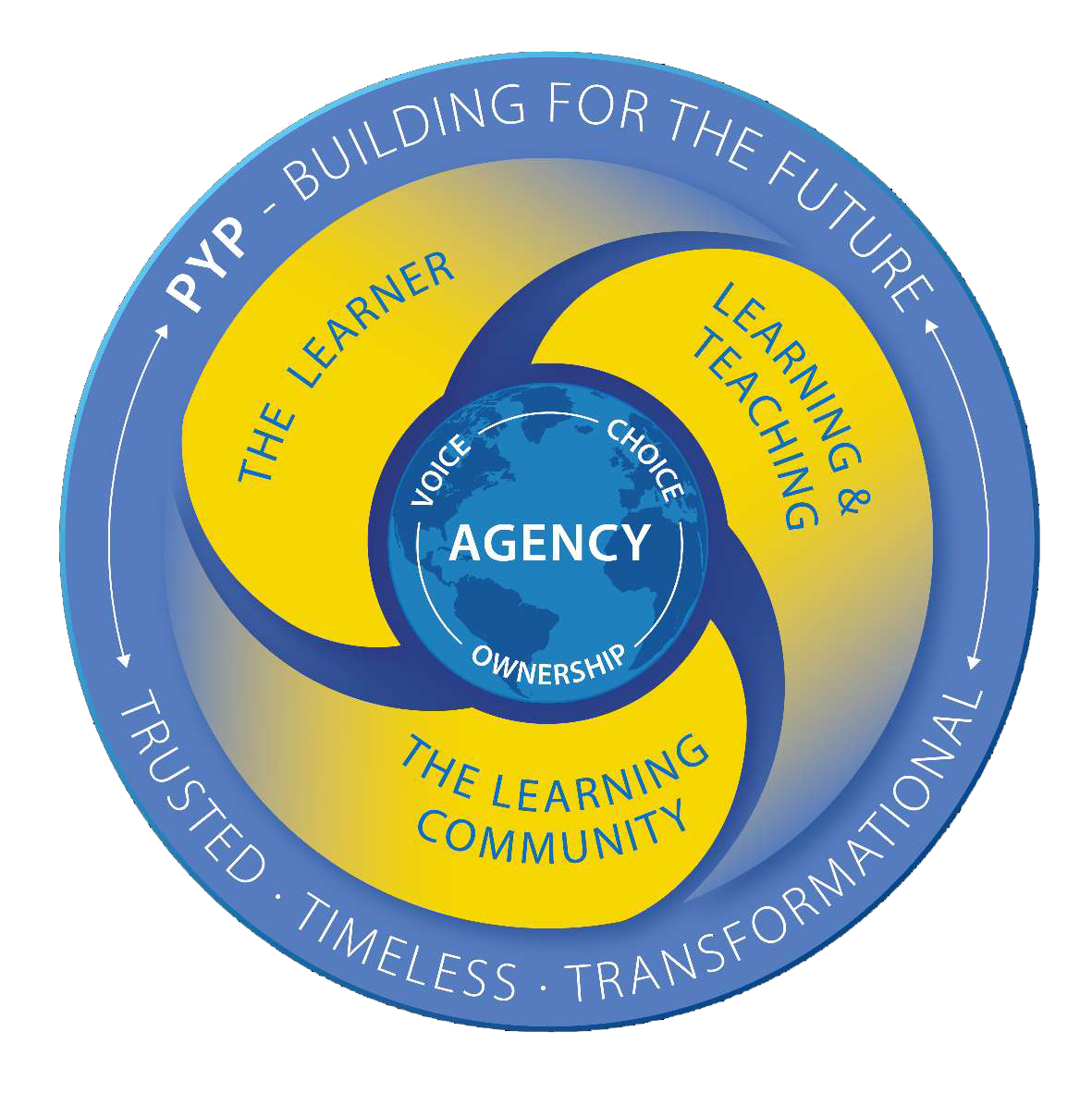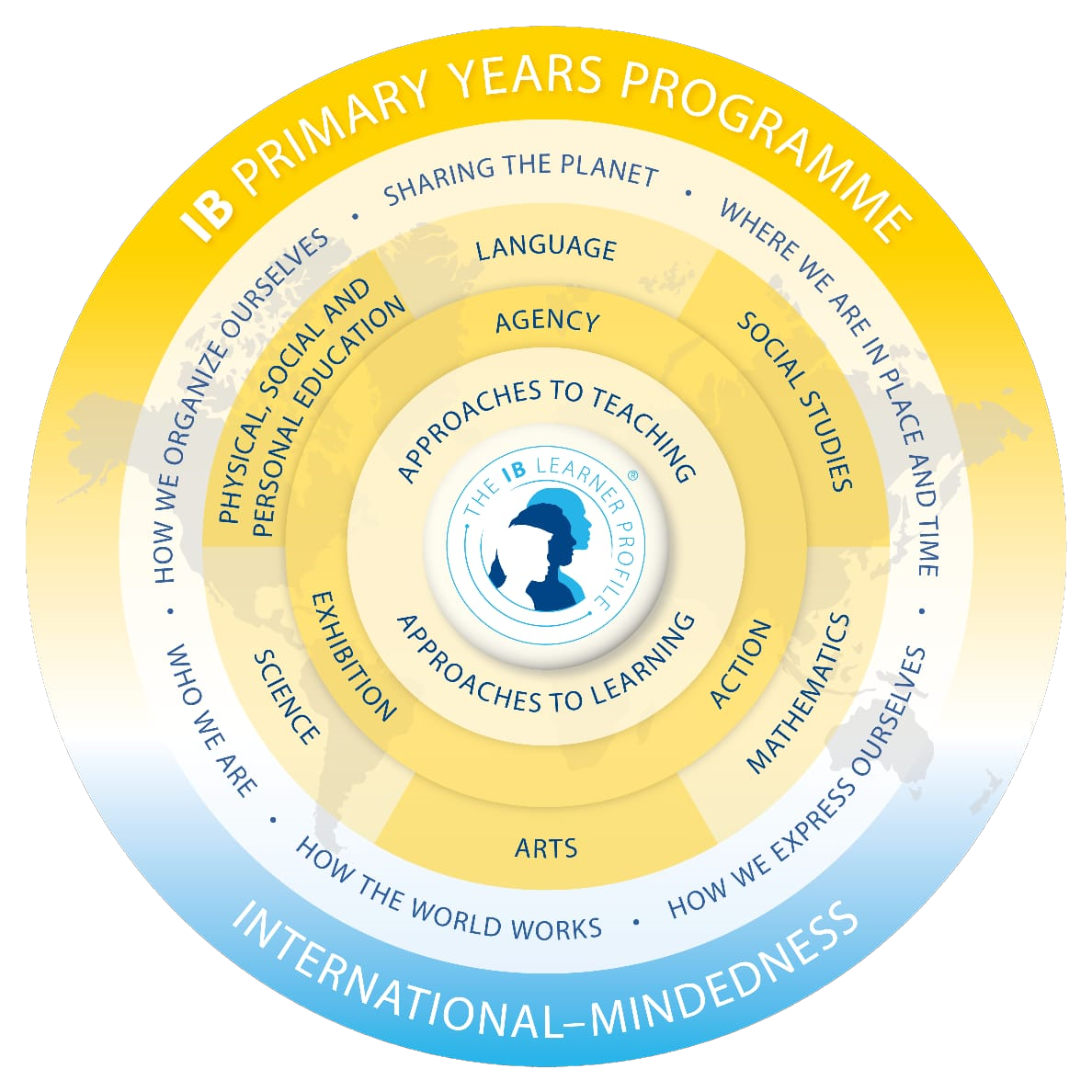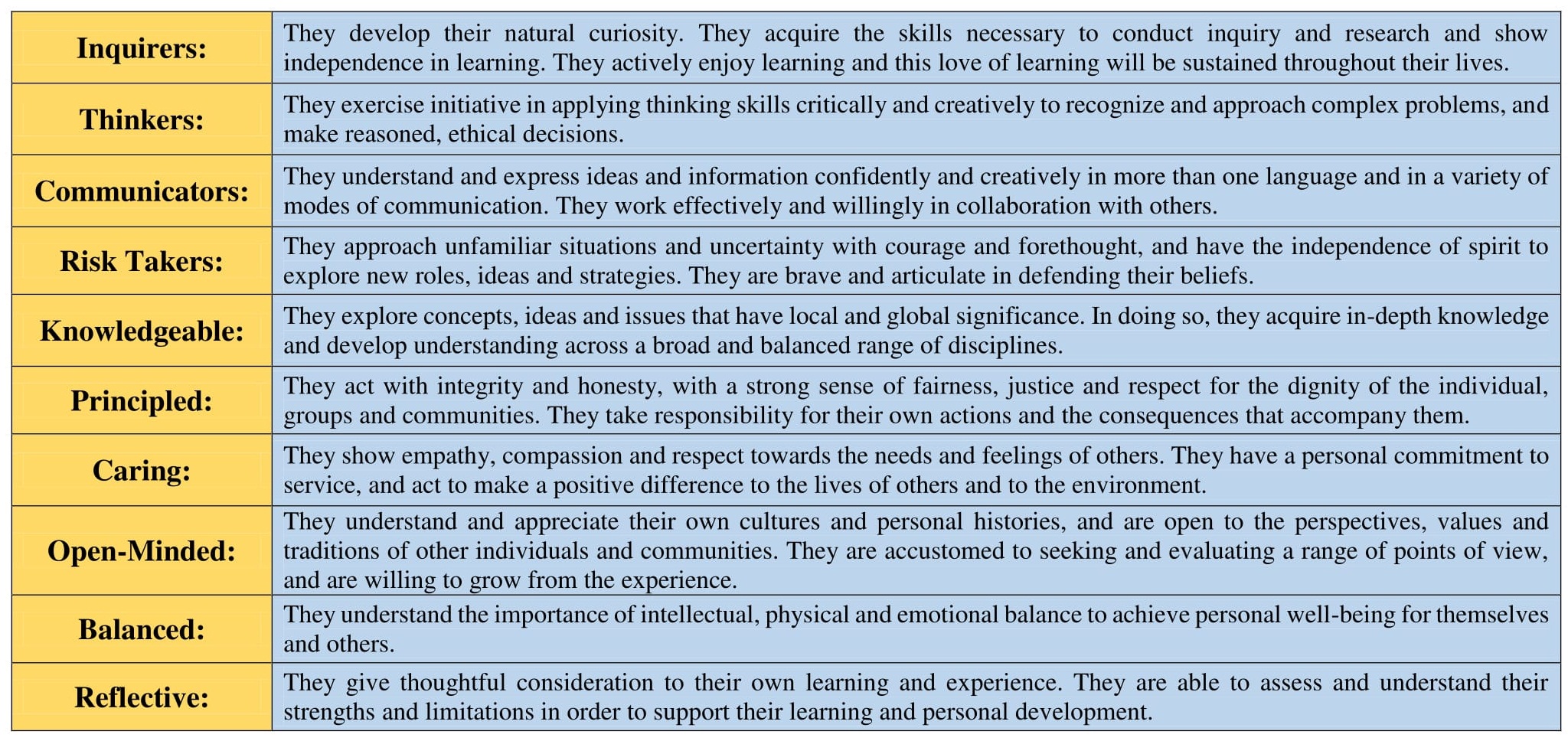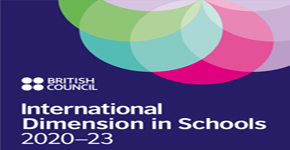IB PRIMARY YEARS PROGRAMME:
Sanskar School, Jaipur appreciates and encourages a childhood that’s driven by curiosity and creativity. As a premier IB school in Jaipur, it is authorised to implement the International Baccalaureate Primary Years Programme (PYP). This also provides a context to build our unique curriculum with concept-driven units.
What is International Baccalaureate Primary Years Programme (IB PYP)?
The PYP is one of the four programmes offered by the International Baccalaureate and is designed for students from ages 3 to 12 years. The PYP prepares students to become active, caring, and lifelong learners who demonstrate respect for themselves and others and have the capacity to participate in the world around them. It focuses on developing the child’s curiosity, both within and beyond the classroom.
The Learner in IBPYP:
Learners have voice, choice and ownership of their learning in PYP. The learning community supports agency and fosters stronger sense of self-efficacy.
Sanskar School fosters a stronger sense of self-efficacy in learners by giving them ownership of their own learning through various platforms.

Curriculum at Sanskar :

At Sanskar School Jaipur, the curriculum is a balanced blend of five essential elements: Concepts, Knowledge, ATL(Skills), attributes of Learner Profile and Action. The knowledge component is developed through inquiries into six transdisciplinary themes of global significance: Who We Are: An inquiry into the nature of the self; beliefs and values; personal, physical, mental, social and spiritual health; human relationships including families, friends, communities, and cultures; rights and responsibilities; what it means to be human. Where We Are in Place and Time: An inquiry into orientation in place and time; personal histories; homes and journeys; the discoveries, explorations and migrations of humankind; the relationships between and the interconnectedness of individuals and civilizations, from local and global perspectives. How We Express Ourselves: An inquiry into the ways in which we discover and express ideas, feelings, nature, culture, beliefs and values; the ways in which we reflect on, extend and enjoy our creativity; our appreciation of the aesthetics. How the World Works: An inquiry into the natural world and its laws; the interaction between the natural world (physical and biological) and human societies; how humans use their understanding of scientific principles; the impact of scientific and technological advances on society and on the environment. How We Organize Ourselves: An inquiry into the interconnectedness of human-made systems and communities; the structure and function of organizations; societal decision-making; economic activities and their impact on humankind and the environment. Sharing the Planet: An inquiry into rights and responsibilities in the struggle to share finite resources with other people and with other living things; communities and the relationships within and between them; access to equal opportunities; peace and conflict resolution.
These themes are selected for their relevance in the real world. They are described as transdisciplinary because they focus on issues that go beyond classroom subjects, and also help facilitators to develop a programme of inquiry.
The PYP facilitators at Sanskar School identify and develop significant ideas that require learners to have a substantial level of involvement. This framework ensures that students examine each theme, participate in leadership training and broaden their horizon.
The learning they receive is supported and balanced by skills and knowledge from six subject areas: Language, Mathematics, Science, Social Studies, PSPE (Personal, Social and Physical Education) and Arts which foster the child’s all-round development.
The PYP aims to create a curriculum that is engaging, relevant, challenging, and significant for the learners between 3–12 years of age. The curriculum is transdisciplinary in that it focuses on issues that go beyond classroom learning.
Key Aspects of IBPYP Curriculum:
On the whole, the PYP Curriculum is organised according to three main aspects:
The written curriculum
The written curriculum comprises five essential elements characteristic to the IB school.
- Knowledge: Knowledge which is disciplinary and transdisciplinary. The disciplinary aspect is represented by traditional subject areas (Language, Mathematics, Science, Social Studies, Arts, PSPE).
- Concepts: There are 7 key concepts which learners explore through structured inquiry to develop a coherent and in-depth understanding which have relevance both within and beyond subject areas.
The 7 Key concepts are:
-
1. Form : What is it like?
2. Function: How does it work?
3. Causation: Why is it like it is?
4. Change: How is it changing?
5. Connection: How is it connected to other things?
6. Perspective: What are the points of view?
7. Responsibility: What is our responsibility?
- Approaches to Learning (ATL/Skills): ATL which are the broad capabilities that learners develop and apply during their classroom learning and in life. There are 5 sets of transdisciplinary skills acquired in the process of structured inquiry. These are:
-
1. Thinking
2. Communication
3. Social
4. Research
5. Self-Management
- Learner Profile: LP which contributes to international-mindedness and the wellbeing of individuals and learning communities.
The IB learners strive to be:

- Action: Action, wherein successful inquiry leads to responsible, thoughtful and appropriate response or change in behavior.
The taught curriculum
This approach provides students with the learning and space they need to develop ideas. It encourages them to question, consider and refine their understanding of the social and natural world by:
Drawing in their prior knowledge.
Providing provocation through new experiences.
Providing opportunities for reflection and consolidation.
The assessed curriculum
Through assessments, teachers identify students’ knowledge, their understanding, their capabilities and their preferences at different stages in the teaching and learning process. This input also enables them to plan and adopt effective teaching methods. It is a thoughtful process at Sanskar.
At Sanskar, learning is a continuous journey. The facilitators, for their part, use a wide range of assessment strategies to collect information on each element of the written curriculum.
Students at Sanskar School are assessed in a variety of ways, including written tests, projects, oral presentations and written reports. Assessment in IB PYP is “criterion referenced.” This means students are scored against standards and using a rubric, not against each other. The rubric states what the criteria are for the assignment and what the score will be for addressing or not addressing each point in that criteria. The rubric allows students to take ownership of their effort and learning.
FAQs
So, what actually is a “Unit of Inquiry”?
A Unit of Inquiry usually lasts for 4-6 weeks. The objective is to cover all 6 Themes throughout the year. For example, during the Unit of Inquiry “Sharing the Planet” students may spend 6 weeks looking at the resources we have in the world and how various countries use, share and dispose off these resources. Students will answer questions like: How do these resources connect people around the world? Or, how are these resources changing and what does that mean for people? These concepts and questions move across all school subjects (i.e. Math, English, Geography, etc.) and apply to real life and the world around us.
And, how does Sanskar implement these Units of Inquiry?
These Units of Inquiry form the Sanskar Program of Inquiry on which our teachers build students’ concepts, knowledge, and skills. The themes provide the structure to articulate subject -specific knowledge from Pre-Primary to Grade 5. With the IB PYP, however,the priority is not on using a set of textbooks, but rather the emphasis is on a wide variety of resources from which teachers and students extract knowledge, develop understanding, and explore ways of applying that to real life.
Why less use of textbooks?
The IB PYP philosophy believes that students learn best through authentic inquiry. While there is certainly a place in the curriculum for some use of textbooks and workbooks, Sanskar uses a wide range of primary and secondary resources that cater best to its students’ individual needs and learning styles. Textbooks do so much of the work for a child that they inhibit development of the critical thinking skills necessary to become a successful life-long learner. The IB PYP also recognizes that it is not knowledge alone that makes a learner successful, but the skills and attitudes they develop along the way.
Please tell me what is a RUBRIC?
A rubric defines what are the standards or requirements that need to be accomplished in order to achieve the overall target or goal. Students should be able to use rubrics in many of the same ways that teachers use them - to clarify the standards for a quality performance, and to guide ongoing feedback about progress towords those standards.
Explain to me a little more about how my child will be assessed at SANSKAR SCHOOL?
At SANSKAR SCHOOL, each Unit of Inquiry allows students opportunities to demonstrate that learning is taking place—that there are shifts, if you will, in their understanding. This may look different across all subject areas—however, this shift in understanding is not always best demonstrated through a piece of written work or a traditional exam. Students may be asked to put together a final project, draw, act out a performance, do a presentation, or some other way to show what they have learned. The goal is for our students to demonstrate that learning has taken place by showing what they understand and how they are applying that understanding to real life and the world around them. At SANSKAR SCHOOL, we believe that assessment is the continuation of the learning process. It is NOT assessment of learning, but it is assessment for learning. The IB views assessment as needing to be authentic, essential, rich, engaging, and feasible—it should incorporate students in the process of evaluating their learning. “Formative” assessment is interwoven into the daily lessons and learning—this ongoing process of “checking in” between teachers and students, helps both teachers and students find out what they already know, in order to plan for the next stage of learning. “Formative” assessment and teaching are directly linked; effective learning cannot take place without one or the other. “Summative” assessment takes place at the end of the teaching and learning process—this is the time that students have the opportunity to demonstrate their understanding and application of what has been learned.
How can parents help students with school work?
Follow up daily with your child to see what homework they have. Help reinforce at home the lessons learnt in class and fulfill the requirements for the next day daily. Help your ward schedule time so they don’t feel overburdened. Realize that you will probably help them with (not do) some of their larger projects. Most parents find pleasure or pride in helping their child grow in this way.
How can I, as a PARENT, get involved in the PYP?
Volunteer to become a Primary Resource Parent by filling in a “Parent as Primary Resource” voucher and share your expertise. Ask children about the theme, central idea, and concepts that they are inquiring into. Show interest in their units of inquiry and plan activities around them whenever you can. Encourage your children to “find out” rather than telling them answers. Ask children about the Learner Profile attributes – point them out in other people, in yourself, in your children’s actions and speech. In terms of keeping contacts you are always welcome at Sanskar. We need your support and assistance to make our school ever greater.
For more information please visit at: http://www.ibo.org





